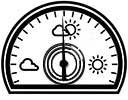How Wales Can Help Save The Bees
According to the BBC, there are 180 species of bee in Wales, but they are in trouble. Seven species have already been wiped out, and there are five more on the brink of extinction. One of the species just barely clinging on is the large mason bee, which is only found in two sites in the Llyn peninsula.
Why should we care?
Bees are absolutely essential to the wellbeing of the planet. They are ‘perfect pollinators’ with each species of bee specialising in pollinating a particular species of plant. With each species of bee that becomes extinct, it harms the chances of survival for that species of plant, too. Plant wellbeing is directly linked to the survival of other species of insects, mammals and birds that depend on them for food. This includes human beings, as the crops that we eat are dependent on bees.
Since the 1930s, the UK has lost 97% of its wildflower meadows, which bees thrived in, so it’s really important that we cultivate spaces for bee populations to flourish. There are some very simple ways that we can do this.
Skip mowing the lawn
Aside from being boring and a bit of a pain, mowing your lawn can also have a negative impact on bees. They really like the dandelions and daisies that naturally thrive in a slightly unkempt lawn, so by skipping a chore, you’re helping the bees too!
Take part in a bee survey
Friends of the Earth is asking people to take part in bee surveys. They have listed surveys for all levels of bee surveyor so you can take part even if you are a complete beginner. The idea is that you look out for the bees in your garden, make a note of any that you see and report back. This helps to build a picture of what species of bee are living where, which in turn helps to inform government policy around conservation.
Bee-friendly plants and houses
Making your garden a bee-friendly space is a fulfilling way to help the bees because you can see it in action. You can do this by ensuring that your garden is populated with bee-friendly plants so that they can get the pollen and nectar that they need. You could also consider buying or building a bee house to attract species of solitary bee (like the Mason bee) to your garden.
Making your garden bee-friendly doesn’t have to be expensive: Savoo is currently offering a range of discount codes for a multitude of businesses including garden centres, so you can get all you need at a fraction of the cost.
Take action on pesticides
The biggest threat to the Welsh bee population is the pesticides that are used in commercial farming. You can have your say on this issue by signing the Friends of the Earth petition to ensure that pesticide reduction is at the heart of the new environmental policy that is being drafted following Brexit.
Buglife Cymru
Buglife Cymru has a wealth of information on its website specifically targeted at saving pollinating species in Wales – definitely worth a read.
Become a Beekeeper
You could take it one step further like wee have and become a beekeeper. It’s easier then you might think to have some honey bee hives in your garden. It does involve some cost and some effort but it’s not that bad and it’s an interesting hobby in its own right. Not only that but you’ll have your very own source of super local honey.













I guess as you looking after bees in other ways you can still keep your nicely mown lawn ? X